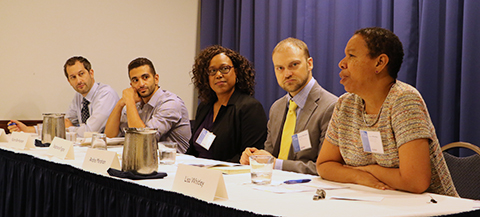Managing Adaptively: It’s About the People! Reflections from MTN 2018
There were so many good sessions at this year’s Moving the Needle event that I know people had a hard time choosing, but those who joined us in one or both of the ‘Managing Adaptively’ breakouts were not disappointed. In the morning, Lisa Whitley, USAID/PPL’s Project Design Team Leader, moderated a really insightful panel from USAID Washington and the field, on how to partner and manage adaptively to empower local organizations and stakeholders.
 Left to right: David Jacobstein, Karim bin-Humam, Stephanie Fugate, Andre Mershon, and panel moderator Lisa Whitley. Photo credit: USAID LEARN.
Left to right: David Jacobstein, Karim bin-Humam, Stephanie Fugate, Andre Mershon, and panel moderator Lisa Whitley. Photo credit: USAID LEARN.
David Jacobstein (Democracy Specialist, USAID Center of Excellence on Democracy, Human Rights, and Governance) spoke about Thinking and Working Politically (TWP), connecting relationships with political stakeholders to program management and keeping pace with the complexity of political change. In the TWP mindset, development outcomes are seen less as a product of technical knowledge transfers and more as a contested decision between winners and losers. The lesson for managing adaptively, then, is that power dynamics and incentive structures have to be taken into account and we may have to change our approaches as we learn more about how those dynamics and incentives really affect the system we are trying to influence.
Karim bin-Humam (Senior ICT Specialist, DAI) represented a winning case from the 2017 Case Competition—“Learning and Adapting Enables Civil Society Innovations in Cambodia”—and shared how the Development Innovations activity in the case developed an adaptive management approach based on a strong, collaborative relationship with USAID/Cambodia. The activity aimed to spur innovation within Cambodia's civil society and build its capacity to design and use information and communication technologies (ICTs). At the activity’s mid-point, it was clear that the services they were offering CSOs and what CSOs actually needed were very different. As a result, the team worked closely with USAID to adapt its offerings and began conducting quarterly internal programmatic assessments through “pause and reflect” events and semi-annual sessions with local partners to check in on progress. Findings from both helped DAI adapt programming and write responsive workplans. Karim also spoke about how the mid-term findings also necessitated a big shake-up in staffing and in the management restructuring, they prioritized skills rather than formal qualifications on CVs, which is how they ended up a senior manager who’s immediate past experience was at MTV!
Stephanie Fugate (Branch Chief and Supervisory Contracting Officer, USAID Office of Acquisition and Assistance ) and Andre Mershon (Resilience Advisor, USAID Center for Resilience) discussed their work in designing adaptive, shock responsive activities and implementing mechanisms in ever-changing environments. Their plea to the session participants and their colleagues throughout USAID was to plan flexibility into activities right from the earliest design and make sure that the mechanism choice and details align and support that need for flexibility. While we can find ways to adapt mid-course, it is much easier if expectations for adaptive management are established from the beginning (and see here for helpful resources in the CLA toolkit). Stephanie also encouraged us to remember the people—it’s not just the words on the paper, but the adaptive management skills of staff on both the USAID and partner sides of the question. This led to a lively discussion, echoing Karim’s points about needing to re-staff in Cambodia, about the skills of an adaptive manager.
Some of the skills and mindsets that Stephanie, Andre, Karim and David flagged as important in managing adaptively included:
Being vested in the development outcomes as a development practitioner, not just a contract manager
Systems thinking and understanding the development context
Active listening and openness to feedback and new ideas (such as those that DAI collected through their internal “pitch” mechanisms)
Understanding operations enough that you know when and how to ‘hack’ them to change a process
Building good relationships and cultivating networks in order to draw resources and expertise from others
These are good additions/reinforcements to the skills listed in the Adaptive Management Discussion Note: curiosity, communication and listening skills, critical thinking, and comfort with uncertainty and change.



